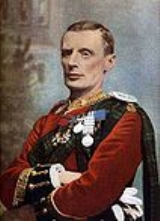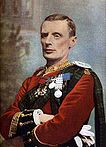
Andrew Gilbert Wauchope
Encyclopedia

British Army
The British Army is the land warfare branch of Her Majesty's Armed Forces in the United Kingdom. It came into being with the unification of the Kingdom of England and Scotland into the Kingdom of Great Britain in 1707. The new British Army incorporated Regiments that had already existed in England...
officer, killed commanding a brigade
Brigade
A brigade is a major tactical military formation that is typically composed of two to five battalions, plus supporting elements depending on the era and nationality of a given army and could be perceived as an enlarged/reinforced regiment...
at the Battle of Magersfontein
Battle of Magersfontein
The Battle of MagersfonteinSpelt incorrectly in various English texts as "Majersfontein", "Maaghersfontein" and "Maagersfontein". was fought on 11 December 1899, at Magersfontein near Kimberley on the borders of the Cape Colony and the independent republic of the Orange Free State...
in the South African War.
Andrew Gilbert was the second son of Andrew Wauchope and Frances-Mary née Lloyd of Niddrie Marischal, Midlothian
Midlothian
Midlothian is one of the 32 council areas of Scotland, and a lieutenancy area. It borders the Scottish Borders, East Lothian and the City of Edinburgh council areas....
, Scotland
Scotland
Scotland is a country that is part of the United Kingdom. Occupying the northern third of the island of Great Britain, it shares a border with England to the south and is bounded by the North Sea to the east, the Atlantic Ocean to the north and west, and the North Channel and Irish Sea to the...
. He was sent to HMS Britannia
HMS Britannia (1820)
HMS Britannia was a 120-gun first-rate ship-of-the-line of the Royal Navy, laid down in 1813 and launched on 20 October 1820.Commissioned in 1823, she saw service in the Mediterranean from 1830-1 and in 1841...
in 1859 to train as a naval cadet, then posted as a midshipman to St George
HMS St George (1840)
HMS St George was a 120-gun first rate ship of the line of the Royal Navy, launched on 27 August 1840 at Plymouth.She was fitted with screw propulsion in 1859, and was sold out of the service in 1883....
the following year. He was not happy there, and obtained his discharge from the Navy on 3 July 1862, shortly before his eighteenth birthday.
He resolved to enter the Army, and purchased a second lieutenant's commission in the Black Watch
Black Watch
The Black Watch, 3rd Battalion, Royal Regiment of Scotland is an infantry battalion of the Royal Regiment of Scotland. The unit's traditional colours were retired in 2011 in a ceremony led by Queen Elizabeth II....
in 1865. In 1867 he was appointed lieutenant, and served as an adjutant from 1870 to 1873. In 1873 he served in the Second Anglo-Ashanti War, detached on special service with a Hausa
Hausa people
The Hausa are one of the largest ethnic groups in West Africa. They are a Sahelian people chiefly located in northern Nigeria and southeastern Niger, but having significant numbers living in regions of Cameroon, Ghana, Cote d'Ivoire, Chad and Sudan...
regiment; he was twice wounded and mentioned in despatches.
In July 1878, the United Kingdom took control of Cyprus as a result of the Cyprus Convention
Cyprus Convention
The Cyprus Convention of 4 June, 1878 was a secret agreement reached between the United Kingdom and the Ottoman Empire which granted control of Cyprus to Great Britain in exchange for their support of the Ottomans during the Congress of Berlin...
, and Wauchope was appointed governor of the Paphos region
Paphos District
Paphos District is one of the six districts of Cyprus and it is situated in the western part of Cyprus. Its main town and capital is Paphos. The entire district is controlled by the internationally recognized government of Cyprus...
, returning to England in August 1880. He was promoted Captain in 1878, and made CMG in 1880.
He served on the staff in the Transvaal War in 1881, and with his regiment in the 1882 Anglo-Egyptian War. That year, he married his first wife, Elythea Ruth Erskine; she would die in childbirth in 1884, leaving him twin sons. He fought in the Sudan Campaign in 1884, where he was severely wounded at the Battle of El Teb on 29 February, and mentioned in despatches. He was promoted to major in March, and given a brevet lieutenant-colonelcy in May, before serving on the Nile Expedition
Nile Expedition
The Nile Expedition, sometimes called the Gordon Relief Expedition , was a British mission to relieve Major-General Charles George Gordon at Khartoum, Sudan. Gordon had been sent to the Sudan to help Egyptians evacuate from Sudan after Britain decided to abandon the country in the face of a...
, where he was again severely wounded at the Battle of Kirbekan
Battle of Kirbekan
The Battle of Kirbekan was a battle in the Mahdist War. It was fought February 10, 1885, when the British Nile Column, about 1,000 strong, under General Earle, stormed the heights of Kirbekan, which were held by a strong Mahdist force, and totally routed them, with heavy loss. The British lost 60,...
in February 1885.
Following the expedition he returned to Scotland to manage his family estates at Niddrie
Niddrie, Edinburgh
This article is about Niddrie, a suburb of Edinburgh. See also: Longniddry, Niddry Castle.Niddrie is a suburb of south east Edinburgh, Scotland, UK...
and Yetholm
Yetholm
Yetholm may refer to one of two communities in the Scottish Borders:*Kirk Yetholm*Town YetholmYetholm can also refer to the parish that contained the villages of Kirk Yetholm and Town Yetholm in the east of the former county of Roxburghshire....
, which he had recently inherited. The coal mines of Niddrie were highly productive, and as a result he became one of the richest men in Scotland. In 1893 he married his second wife, Jane Muir, the daughter of William Muir
William Muir
Sir William Muir, KCSI was a Scottish Orientalist and colonial administrator.-Life:He was born at Glasgow and educated at Kilmarnock Academy, at Glasgow and Edinburgh Universities, and at Haileybury College. In 1837 he entered the Bengal Civil Service...
; they had no children, and she would survive him.
A staunch Conservative, he was politically active, and opposed Gladstone
William Ewart Gladstone
William Ewart Gladstone FRS FSS was a British Liberal statesman. In a career lasting over sixty years, he served as Prime Minister four separate times , more than any other person. Gladstone was also Britain's oldest Prime Minister, 84 years old when he resigned for the last time...
for the constituency of Midlothian
Midlothian (UK Parliament constituency) (1708-1918)
Edinburghshire was a county constituency of the House of Commons of the Parliament of Great Britain from 1708 to 1801 and of the Parliament of the United Kingdom from 1801 to 1918....
in the 1892 election
United Kingdom general election, 1892
The 1892 United Kingdom general election was held from 4 July to 26 July 1892. It saw the Conservatives, led by Lord Salisbury, win the greatest number of seats, but not enough for an overall majority as William Ewart Gladstone's Liberals won many more seats than in the 1886 general election...
; whilst he did not win, he reduced Gladstone's majority by over 80%. He opposed the coal strike of 1894 and the proposed eight-hour work limits for miners, but was generally recognised by his workers as a generous employer; during the coal strike he supported the families of the strikers. He again ran for Parliament at a by-election in Edinburgh South
Edinburgh South (UK Parliament constituency)
Edinburgh South is a constituency of the House of Commons of the Parliament of the United Kingdom, first used in the general election of 1885. It elects one Member of Parliament by the first past the post system of election...
in June 1899, losing to Arthur Dewar. On the local level, he was an elder of his parish church and member of the local school board, as well as the parish council and the General Assembly of the Church of Scotland
General Assembly of the Church of Scotland
The General Assembly of the Church of Scotland is the sovereign and highest court of the Church of Scotland, and is thus the Church's governing body[1] An Introduction to Practice and Procedure in the Church of Scotland, A Gordon McGillivray, 2nd Edition .-Church courts:As a Presbyterian church,...
.
He was promoted to colonel in 1888, being made CB in 1889 and given command of the 2nd Battalion of the Black Watch in 1894. In 1898 he commanded a brigade in the reconquest of the Sudan, seeing action at Atbara
Battle of Atbara
The Battle of Atbara took place during the Second Sudan War. Anglo-Egyptian forces defeated 15,000 Sudanese rebels, called Mahdists or Dervishes. The battle proved to be the turning point in the conquest of Sudan by a British and Egyptian coalition....
and Omdurman
Battle of Omdurman
At the Battle of Omdurman , an army commanded by the British Gen. Sir Herbert Kitchener defeated the army of Abdullah al-Taashi, the successor to the self-proclaimed Mahdi Muhammad Ahmad...
, and was promoted to major-general that year as a result.
He was appointed to command the 3rd (Highland) Brigade in the South African War, which saw action at Belmont
Battle of Belmont (1899)
The Battle of Belmont is the name of an engagement of the Second Boer War near the town of Belmont, 23 November 1899, where the British under Lord Methuen assaulted a Boer position on a kopje....
and Modder River
Battle of Modder River
The Battle of Modder River was an engagement in the Boer War, fought at Modder River, on 28 November 1899...
as part of the force sent to relieve Kimberley
Siege of Kimberley
The Siege of Kimberley took place during the Second Boer War at Kimberley, Cape Colony , when Boer forces from the Orange Free State and the Transvaal besieged the diamond mining town. The Boers moved quickly to try to capture the British enclave when war broke out between the British and the two...
. Pushing further, they again encountered the Boer force at Magersfontein
In the resulting Battle of Magersfontein
Battle of Magersfontein
The Battle of MagersfonteinSpelt incorrectly in various English texts as "Majersfontein", "Maaghersfontein" and "Maagersfontein". was fought on 11 December 1899, at Magersfontein near Kimberley on the borders of the Cape Colony and the independent republic of the Orange Free State...
, the Highland Brigade was ordered to make a dawn attack on the Boer defences. However, the force was delayed in its advance, being spotted before it was prepared to attack, and faulty reconnaissance meant that the enemy positions were not properly located; the column came under heavy fire as it struggled to deploy for action. Wauchope was killed by rifle fire in the opening minutes of combat; the brigade was pinned and went to ground. It held its position for a short while - after Wauchope's death, it was leaderless, and no-one would take command until late in the afternoon - but could not be supported, and in the early afternoon retreated.
Wauchope's dying words are a subject of some dispute; Douglas' biography, quotes them as Don't blame me for this, lads. Arthur Conan Doyle wrote that:
Sources
- "Wauchope, Andrew Gilbert (1846–1899)", E. I. Carlyle, rev. Roger T. Stearn, in the Oxford Dictionary of National Biography. Oxford University Press, 2004

